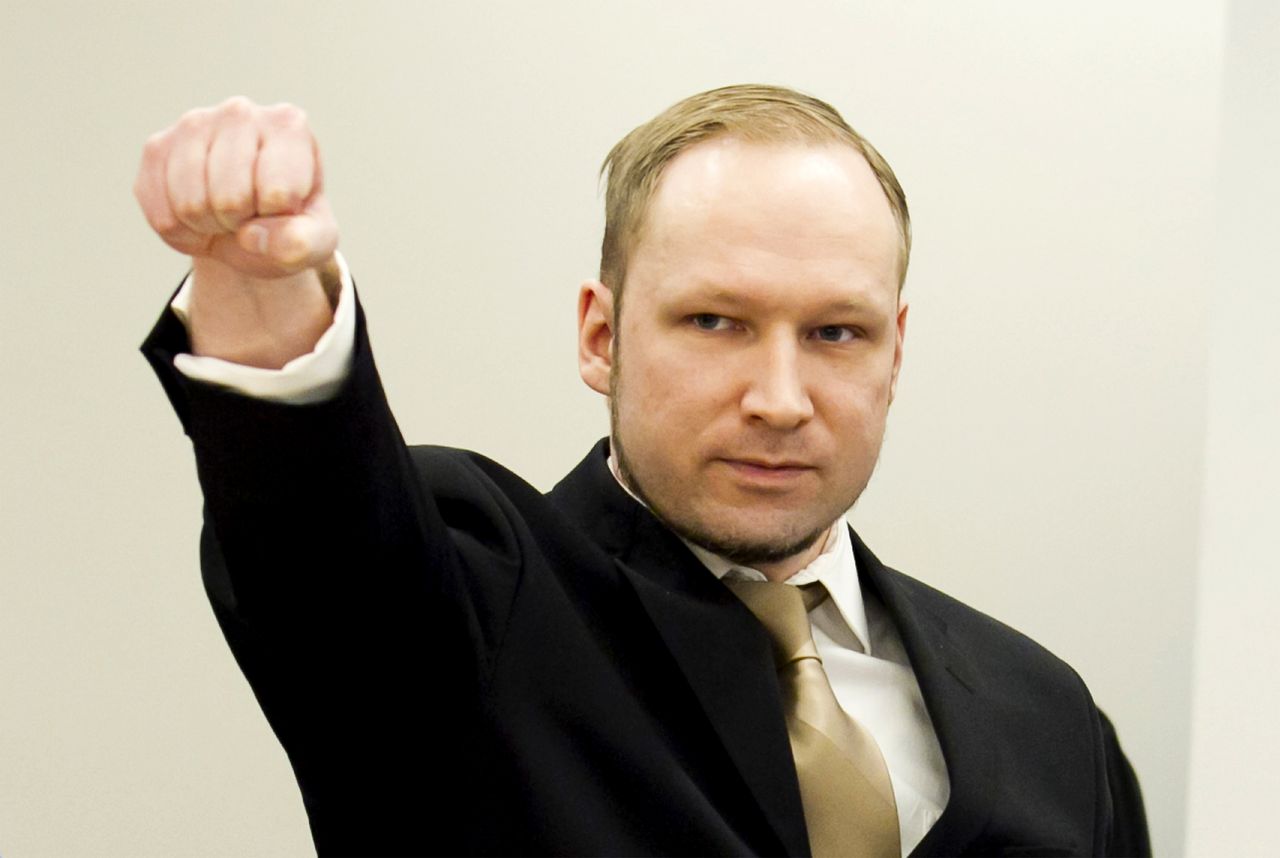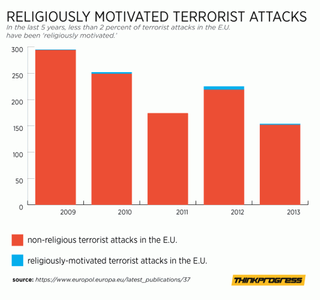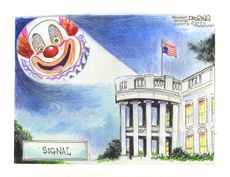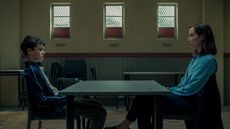What if Muslims blamed moderate Christians for terrorist attacks?
It's not as absurd as it sounds


Most of the high-profile terrorist attacks of the past 15 years have been carried out (or attempted) by Muslim extremists, usually aligned with one of a handful of terrorist organizations: Al Qaeda and its regional offshoots, Boko Haram, separatists in Russia's Caucuses region, Jemaah Islamiyah, the Taliban, Islamic State.
After the terrible attacks in Paris by at least three Muslim gunmen — two pledging fealty to Al Qaeda, one to ISIS — there's been a lot of discussion about how much Islam as a whole is responsible for Islamist extremists. Conservative media baron Rupert Murdoch got a lot of flak for this tweet:
But he was speaking for a lot of people, including self-professed liberals like Bill Maher and, incidentally, Egyptian President Abdel-Fattah el-Sissi. It's a provocative question — is there something fundamental about Islam that encourages mass killings?
Subscribe to The Week
Escape your echo chamber. Get the facts behind the news, plus analysis from multiple perspectives.

Sign up for The Week's Free Newsletters
From our morning news briefing to a weekly Good News Newsletter, get the best of The Week delivered directly to your inbox.
From our morning news briefing to a weekly Good News Newsletter, get the best of The Week delivered directly to your inbox.
The most common rebuttal is that there are some 1.6 billion Muslims, and the vast majority don't kill people or even want to. Islam, at its core, is a religion of peace. This is the line most mainstream politicians take, dating back to at least then–President George W. Bush after the Sept. 11, 2001, terrorist attacks on the U.S. — carried out by, yes, Muslim extremists.
"France is at war with terrorism, jihadism, and radical Islamism," French Prime Minister Manuel Valls said to the National Assembly on Jan. 13. "France is not at war with a religion. France is not at war with Islam and Muslims."
"We will not allow ourselves to be divided by those who, in the face of Islamist terror, place Muslims in Germany under general suspicion," German Chancellor Angela Merkel vowed two days later. "There must be no ostracism of Muslims, no sweeping suspicions.... As chancellor, I will come to the defense of Muslims in this country against that."
So, how do you square that circle? One way is to point out, as Dean Obeidallah does at The Daily Beast, that the vast majority of terrorist attacks in the U.S. and Europe are not, in fact, carried out by Muslims. He points to Interpol's 2014 EU Terrorism Situation and Trend Report, which found that more that half of all European terrorism in the past five years has been carried out by separatists — versus 2 percent that were motivated by religion, as ThinkProgress maps out:

In the U.S., Islamist extremists committed only 6 percent of terrorist attacks — lower than Latino groups (42 percent), extreme left-wing groups (24 percent), and Jewish extremists (7 percent) — according to a tally by the admittedly anti-Muslim-fearmongering site Loonwatch. They draw their numbers from FBI data, however, which you can read for yourself. (The deadliest attack by far, of course, was 9/11.)
But another way to drive home the disproportionate weight we give to Muslim extremism is to imagine if the mainstream Muslim press and intellectual class judged all violence through the lens of Christian extremism.
Kareem Abdul-Jabbar, the basketball legend, goes there a bit. After "horrendous" terrorist acts like the ones in Paris, he says in Time, "celebrity Muslims" like him are always "thrust in the spotlight to angrily condemn, disavow, and explain — again — how these barbaric acts are in no way related to Islam." But:
When the Ku Klux Klan burn a cross in a black family's yard, prominent Christians aren't required to explain how these aren't really Christian acts. Most people already realize that the KKK doesn't represent Christian teachings [Abdul-Jabbar]
At The Daily Beast, Obeidallah (also a Muslim) brings up extremist violence aimed at abortion clinics — including at least seven murders and lots of arsons, bombings, and acid attacks, according to National Abortion Federation data. "Honestly, when is the last time we heard the media refer to those who attack abortion clinics as 'Christian terrorists'?" he asks. And then he turns to Europe:
Even after one of the worst terror attacks ever in Europe in 2011, when Anders Breivik slaughtered 77 people in Norway to further his anti-Muslim, anti-immigrant, and pro–"Christian Europe" agenda as he stated in his manifesto, how much press did we see in the United States?... We didn't see terrorism experts fill the cable news sphere asking how we can stop future Christian terrorists. In fact, even the suggestion that Breivik was a "Christian terrorist" was met with outrage by many, including Fox News' Bill O'Reilly. [Obeidallah]
If Muslim commentators did want to view terrorism through a Christian lens, they would have ample material to work with.
Forget the terrorizing violence perpetrated by street gangs in the U.S. and Latin America, as well as other acts of violence committed by presumptive Christians in the West. Let's just look at Christian terrorists.
There are the ones whose names you probably already know: Eric Robert Rudolph, who attacked several gay clubs and abortion clinics after bombing the 1996 Summer Olympics in Atlanta; Breivik, whom Boston University religion scholar Stephen Prothero called a "Christan terrorist" who "rooted his hate and his terrorism in Christian thought and Christian history, particularly the history of the medieval Crusades against Muslims"; abortion-doctor-killers Scott Roeder and James Charles Kopp; Joseph Kony, founder of the brutal Lord's Resistance Army; and arguably Timothy McVeigh, the Oklahoma City bomber who was influenced to some degree by the Christian Identity movement.
But there are plenty of others you've never heard of. Buford Furrow, for example: An adherent of the Phineas Priesthood and former Aryan Nations security guard who shot up a Jewish community center in Los Angeles in 1999, wounding five people and then killing a Filipino postal carrier. Or Larry McQuilliams, a self-identified Phineas "high priest" who fired more than 100 shots at the police headquarters and other government buildings in Austin last fall.
The Southern Poverty Law Center's catalog of violent extremist groups includes several Christian Identity–linked factions, including the Phineas Priesthood — not really a group, but individuals inspired by Christian Identity adherent Richard Kelly Hoskins and his interpretation of the Old Testament Book of Phineas who attack mostly mixed-race couples — as well as "Radical Traditionalist" Catholics.
Outside of the U.S., Northern Ireland spent decades in a bloody grudge match between Catholic republican paramilitaries like the Provisional IRA and the Protestant Ulster unionist factions. Maronite militias massacred scores of Palestinians at Lebanon's Sabra and Shatila refugee camp in 1982.
There are Christian terrorists because there are about 2.2 billion Christians in the world, and people are people.
Muslim pundits could demand that moderate Christians denounce extremist Christianity every time a Russian gang tortures and kills a gay person, in a crackdown on homosexuality tacitly encouraged by the Russian Orthodox Church. Or they could complain if "celebrity Christians" weren't vocally outraged every time a horde of anti-balaka Christian vigilantes slaughters Muslim civilians in the Central African Republic.
Should Christians have to explain that Christianity is a religion of peace every time so-called Christian Patrols affiliated with the UK's nationalist Britain First party drive through Muslim areas of London passing out alcohol and anti-Muslim pamphlets to "defend British soil against Muslim extremists"? Or every time the loons from Westboro Baptist Church crash another funeral with their despicable protests?
The idea seems absurd. And that's kind of the point. When you engage in collective blame, the finger will eventually point back to you — there's no tribe without blood on its hands, at least metaphorically.
Terrorism isn't just about body counts, of course. It's a tactic to instill fear in people, and obviously Islamist terrorists have done a better job of capturing the West's attention than, say, the Phineas Priesthood. But each terrorist act by a small group of murderers should be judged on its own demerits, not lumped into ethno-religious buckets to be weighed and measured.
"That's what I and other Muslims long for," says Abdul-Jabbar at Time:
The day when these terrorists praising Mohammed or Allah's name as they debase their actual teachings are instantly recognized as thugs disguising themselves as Muslims. It's like bank robbers wearing masks of presidents; we don't really think Jimmy Carter and George W. Bush hit the Bank of America during their down time.... I look forward to the day when an act of terrorism by self-proclaimed Muslims will be universally dismissed as nothing more than a criminal attack of a thuggish political organization wearing an ill-fitting Muslim mask. [Abdul-Jabbar]
Dare I say amen?
Sign up for Today's Best Articles in your inbox
A free daily email with the biggest news stories of the day – and the best features from TheWeek.com
Peter has worked as a news and culture writer and editor at The Week since the site's launch in 2008. He covers politics, world affairs, religion and cultural currents. His journalism career began as a copy editor at a financial newswire and has included editorial positions at The New York Times Magazine, Facts on File, and Oregon State University.
-
 5 tactically sound cartoons about the leaked Signal chat
5 tactically sound cartoons about the leaked Signal chatCartoons Artists take on the clown signal, baby steps, and more
By The Week US Published
-
 Roast lamb shoulder with ginger and fresh turmeric recipe
Roast lamb shoulder with ginger and fresh turmeric recipeThe Week Recommends Succulent and tender and falls off the bone with ease
By The Week UK Published
-
 Adolescence and the toxic online world: what's the solution?
Adolescence and the toxic online world: what's the solution?Talking Point The hit Netflix show is a window into the manosphere, red pills and incels
By The Week Staff Published
